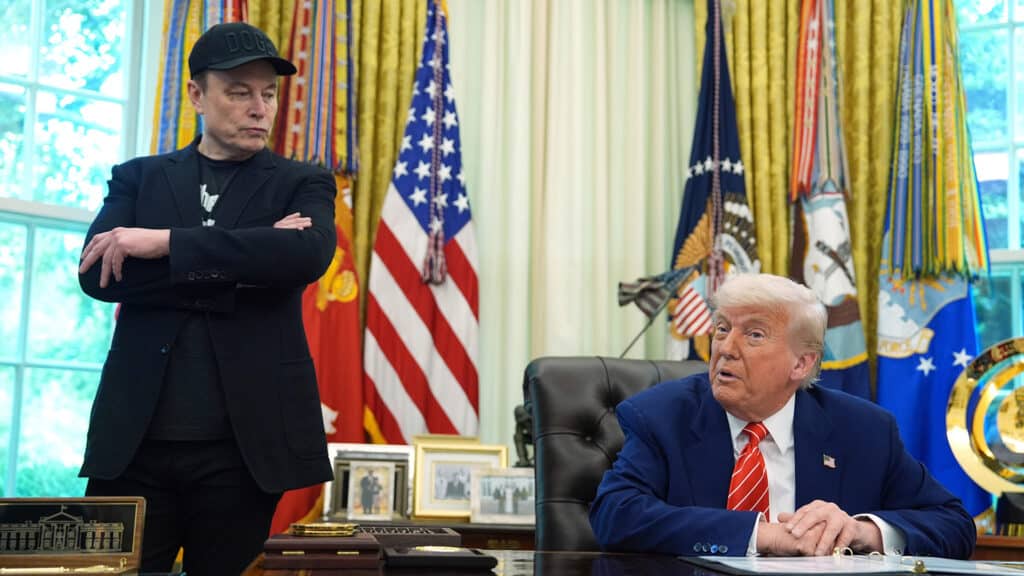
Newsletter Subscribe
Enter your email address below and subscribe to our newsletter

Enter your email address below and subscribe to our newsletter

A deep dive into how a spending bill ignited an all-out war between Donald Trump and Elon Musk, leading to threats over billions in government contracts, market chaos, and a crisis within the Republican party.
What began as a political alliance of convenience has spectacularly imploded into one of the most consequential feuds in modern American history.
The relationship between President Donald Trump and tech titan Elon Musk—once a cornerstone of the new Republican-Silicon Valley axis—has shattered in a public firestorm over a massive spending bill, threatening to derail the President’s legislative agenda, jeopardize critical national security contracts, and cleave the conservative movement in two.
The conflict has escalated from a policy debate into a bare-knuckle power struggle, waged in Oval Office press conferences and late-night tirades on social media. With threats to terminate billions in government contracts for Musk’s companies and Musk’s own public mobilization against the President, this is no longer just a clash of titans. It is a defining battle over the future of American capitalism, the role of government, and the ideological identity of the Republican Party.
The catalyst for the implosion was the “One Big Beautiful Bill,” a sweeping tax-and-spending package that constituted President Trump’s signature domestic priority. While the bill included Republican-favored tax cuts, its projected impact on the national debt, estimated by the Congressional Budget Office to add trillions, drew the ire of fiscal conservatives.
No critic was louder or more influential than Elon Musk. In a move that sent shockwaves through Washington, Musk used his platform, X, to launch a digital insurrection against the bill. He urged his millions of followers to flood congressional phone lines, declaring that “bankrupting America is NOT ok!”
President Trump, blindsided by the public betrayal from a key ally, retaliated from the Oval Office. He dismissed Musk’s opposition as a self-serving tantrum over the bill’s elimination of EV subsidies.
“Elon’s upset because we took the EV mandate… which, you know, was a lot of money for electric vehicles,” Trump told reporters.
The feud then spiraled into open warfare. Musk vehemently denied Trump’s accusation, stating his opposition was purely on fiscal principle. Trump escalated dramatically, threatening the foundation of Musk’s empire.
“The easiest way to save money in our Budget,” Trump wrote on Truth Social, “is to terminate Elon’s Governmental Subsidies and Contracts.”

The threat was unambiguous. SpaceX, in particular, is deeply reliant on federal contracts, having secured billions from NASA and the Department of Defense. Musk’s stunning reply—”Go ahead, make my day”—and his subsequent (and quickly retracted) threat to decommission the Dragon spacecraft revealed how personal and perilous the conflict had become.
“In light of the President’s statement about cancellation of my government contracts, @SpaceX will begin decommissioning its Dragon spacecraft immediately,” Musk wrote.
The battle over the spending bill exposed the fundamental, irreconcilable differences in the economic philosophies of Trump and Musk.
The public schism has left the Republican Party in chaos. Fiscal conservatives, who have long been uneasy with Trump’s spending habits, find themselves in an awkward alliance with Musk. Meanwhile, Trump loyalists see Musk’s actions as an unforgivable act of betrayal against their party leader. This has created deep divisions, with Republican lawmakers caught between appeasing the President and heeding the warnings of a powerful public figure who has the ear of many of their voters.
The financial markets have reacted with alarm. Tesla’s stock price experienced extreme volatility, with one clash wiping out over $150 billion in market value in a single day. Investors are now forced to price in a new, unpredictable “feud risk” into one of the world’s most valuable companies.
The consequences for national policy are equally severe. The threat to SpaceX contracts has raised alarms at the Pentagon and NASA, as it could disrupt everything from satellite launches to the Artemis program aimed at returning Americans to the moon.
As of this writing, there are signs of an uneasy truce. Musk has publicly stated that he “regrets” some of his posts, suggesting they “went too far.” But the damage is done. The deep ideological rift has been exposed, and the trust between two of the most powerful men in America has been shattered. Whether they can rebuild their alliance remains an open question, but their spectacular falling out will be remembered as a defining moment in American politics and business.